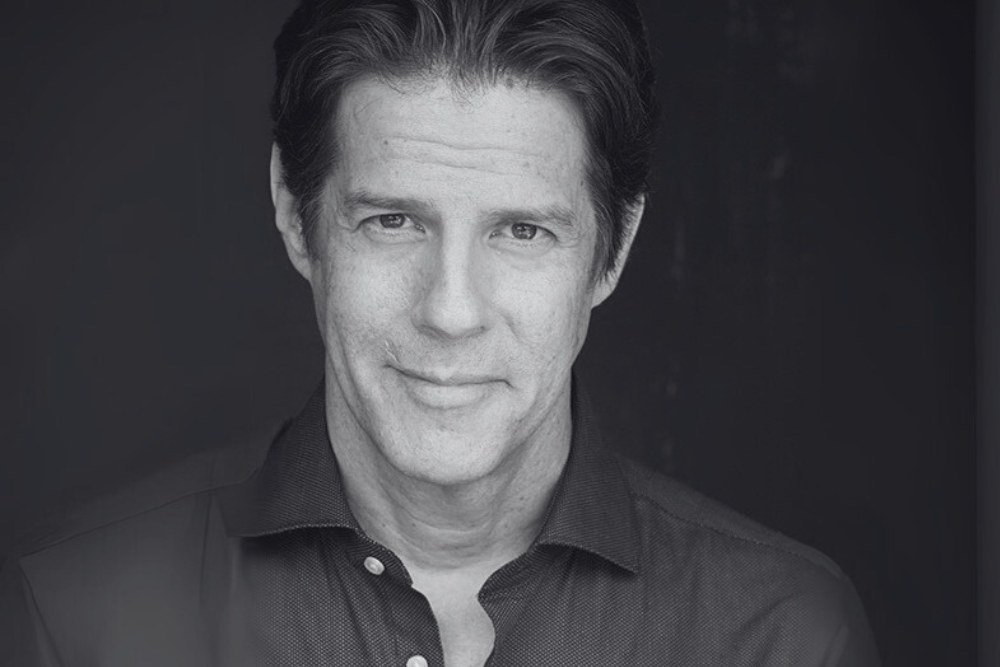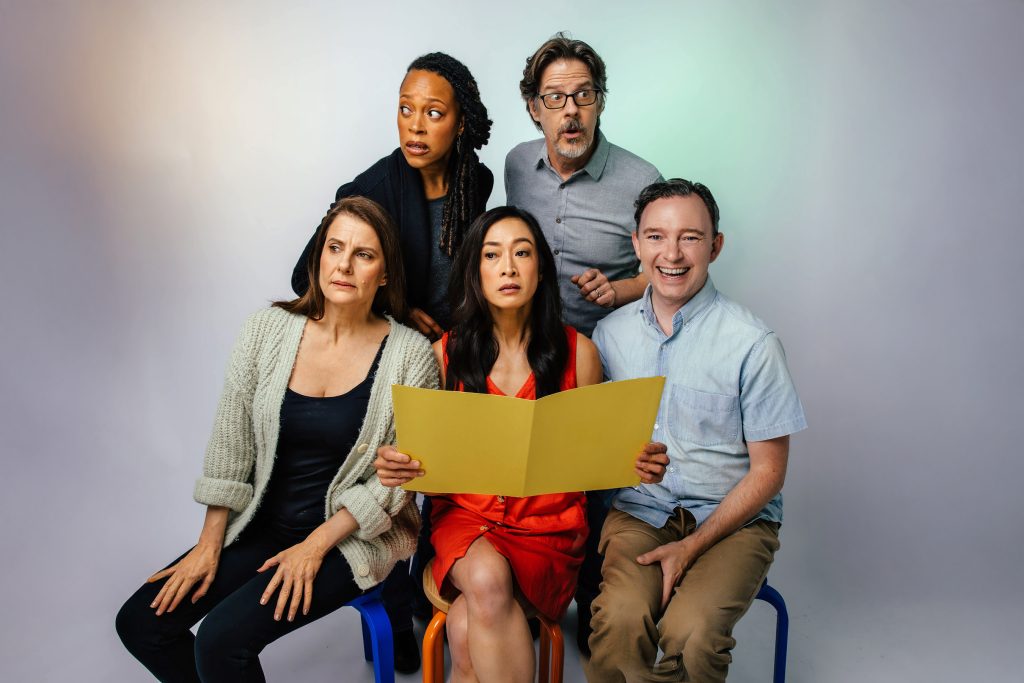Prepare for a riotous clash of ideals and egos as Eureka Day, Jonathan Spector’s 2025 Tony Award-winning satire, uproariously takes the Pasadena Playhouse by storm (September 10th through October 5th) under the deft direction of Teddy Bergman. In a world where vaccination debates spark fiery discourse, this wickedly clever comedy infects audiences with its tremendous wit, turning prickly conversations and heated arguments into comedic gold that’s as thought-provoking as it is hilarious.
Set in a progressive private school in Berkeley, CA, Eureka Day captures a can’t-take-your-eyes-off-it bedlam as its well-intentioned administrators, aiming for an inclusive vaccination policy during a mumps outbreak, spiral into a gloriously unhinged meltdown of passive aggressiveness and full-blown hysteria. Since its debut in 2018 (you read that correctly — two years before the Covid-19 outbreak), this biting work has earned praise for tapping into the pulse of America’s divided landscape, delivering laughs that resonate with today’s fraught social debates.

In the eye of this comedic tornado is a stellar cast, including Mia Barron as Suzanne, Cherise Boothe as Carina, Camille Chen as Meiko, Nate Corddry as Eli, and Rick Holmes as Don.
Holmes, a Southern California transplant and Broadway veteran known for Peter and the Starcatcher and The Visit, embodies Don, the conflict-averse head of Eureka Day School. Idiosyncratic, but no less likeable, Don struggles to mediate the Board’s clashing personalities — his attempts to remain calm repeatedly tested in the face of an escalating chaos. In this exclusive interview with LAexcites, Holmes shares insights into taking on this quirky, vulnerable leader.

The play is described as a razor-sharp satire. How do you think the show effectively blends humor with some of the story’s serious undertones?
Holmes: I think that’s one of the marks of a great play when it draws you in with humor and then slaps you in the face [laughs]. It’s a real challenge because the culture war and polarization have intensified, even though this culture war is not the same one that we know and hate now; it’s a battle between progressives.
The humor comes from [Jonathan Spector’s] incredible ear for how we communicate. We sometimes go down these blind alleys and try to work our way out of it, and seeing people do that is what [Jonathan] gets on a gut and ear level. It’s fantastic to put that out as an actor — it’s funny.
[The play] is mostly watching people at their worst and identifying with the notion they’re being good people and doing the best they can — and they are doing their best — but they’re faced with a daunting crisis they’re not equipped to handle; or, they’re trying to apply what they normally apply, and it isn’t really working. Trying to see them be the people they want to be — and fail — is funny and poignant.
In this show there’s real pathos or tragedy people are dealing with it, but in the end, it’s about internecine struggles; it’s like an office comedy. With these personalities, [Jonathan] creates starkly different people we recognize by throwing them in a room and lighting a match [laughs]. It’s the best play I’ve been in years.
There’s also a kind of musicality or poetry to this play; you can see that in the way [Jonathan] does it spatially or the way he starts and ends lines. A lot of his sentences will start and reverse themselves and head back. It mirrors real life with the starts, stops, and reverses — he’s got an ear for it, it’s super fun to read, and it is fun as an actor because you feel like you can live in that rhythm of speech, which is what makes this funny. The director, Teddy, is saying it’s a guide, and not something to be enslaved by, but it gives us so many cues, just like how Shakespeare gives us cues with his usage of iambic pentameter.

Your character Don is the head of a progressive Berkeley school. How do you navigate the satirical tone of Eureka Day to reflect both his leadership and his discomfort with the escalating conflicts, especially in light of the play’s vaccination debate?
Holmes: Of course, [Don] doesn’t know he’s in a satire [laughs]. The trick is to be earnest and not show your cards too much. There’s a certain depth, which I’ve experienced already in the first week of rehearsals, and there’s the real trap of letting the audience know that you’re a willing participant in the satire. [Don] deals with several circumstances at once and sees himself as a facilitator of consensus.
When things go sideways, [Don] is trying to help get things back to equilibrium which he takes lots of pride in. He’s also competent and well-liked, but he’s had challenges and learns through meditation, following an ethos to be the kind of person he wants to be, but somewhere underneath is that guy who is going to lose it if you push him too far. And we all get pushed beyond the limits we’re capable of. He’s trying to earnestly solve stuff and prevent a tidal wave from going further up the shore, but he can’t stop it.
Jonathan takes care of the satire. [As my character], I try to get this group to work together. And then, of course, there’s moments [Don] has to pull the ripcord. There’s a point [in the story] where you have to do what you hoped to avoid in order to help and save the school.

Can you personally identify with a time when you were challenged or had to rise to the occasion to do something that felt unfamiliar or uncomfortable?
Holmes: One thing I’m doing right now is as an old father dealing with a toddler. I think I have, and am, invested in the belief of myself as a listener and I do think I bring a lot to the party as a playful, positive person, but every day there’s a situation when the limits of my ability to make things go the way I want are challenged. One thing I’m dealing with now is buckling [my toddler] in a car seat, but he doesn’t want to go there [laughs]. How many strategies can I try so we can get in the car and go somewhere? [laughs].
So, I’ve felt this with him a lot and out in the world, socially — rehearsing a play can be that way in trying to come to consensus, although this particular play has been a blissful experience. But there are other experiences where you have other points of view that require a sense of compromise and quasi-consensus; ultimately, you have to come to a place where I, the actor, can believe in it, and the director is pleased. Sometimes you don’t all feel the same way about something.

What are some of your impressions of director Teddy Bergman over the last week to bring this acclaimed play to life at the Pasadena Playhouse?
Holmes: I have a lot of impressions of him [laughs]. We met initially when he was 28 during Peter and the Starcatcher — we spent time in a dressing room for six months. He’s an old pal; I’ve known him as this funny and smart guy. I also did a workshop with him years ago as he was starting out as a director. I’m super impressed with how he handles the text and people; he just intuitively has a sense of joy and positivity. He seems to always know how to say something that unlocks this or that moment without being overly precious about it as sometimes, with directors, there’s a performative thing where they want to run the room and draw attention, but [Teddy] wants to just get on with the tasks ahead in a humorous and positive way.
I was talking to the costume designer (Denitsa Bliznakova) about how clear [Teddy] was about everything, and how he has all his ducks in a row. As an actor’s director, he’s a dream, although sometimes directors who were actors give you too much and want to perform it for you, which thankfully doesn’t happen here.

Given the play’s relevance to current issues like the recent measles outbreak, how do you think Eureka Day resonates with audiences in 2025?
Holmes: I think the humor of it will carry the day, regardless, but we’re in a different place as the country has shifted. People may hear it in a different way, things will land differently — it’s going to be hitting people in various ways depending on how they’ve dealt with or argued about such topics amongst themselves. [Jonathan] brings so much humor to it, with a keen understanding of human behavior. In the end, regardless of where the culture is, if it’s this moment or that moment, [Eureka Day] will always work as a play with a deep relevance.

We kind of touched on this with the previous question, but what do you hope audiences in Pasadena take away from Eureka Day about navigating differing beliefs in today’s polarized climate?
Holmes: As it pertains to Pasadena, specifically, I don’t know exactly as I’m a relative newcomer to the area. I think people, and the country as a whole, are a whole lot more involved in education, especially during the pandemic when classrooms came to living rooms, which had positives and negatives. People got more involved in children’s lives not just with vaccinations but curricula — and there were vehement feelings about what is and isn’t happening in classrooms. People will starkly recognize that more than ever.
And school board meetings can be insane when opened to communities — we’ve all read about heated stuff that’s happened at these meetings since the pandemic. To take something like that is scary and, to package it in an entertaining way, is a real trick and feat. There’s so much and everyone has an opinion about what can be said, or can’t be read, and it’s very daunting [laughs].
Overall, it’s one of the best plays I’ve read in a long time and if we don’t screw it up, it will be a great evening of theater — it’s a wonderful cast and I’m jazzed about it. In addition to what it makes people think about, it will be a fun evening of theater where people get to see characters navigating disastrous situations when they don’t have the tools to do it. The play does more than answer questions about vaccinations; rather, it applies to any topic where human beings try to be the best versions of themselves and still fail [laughs].
Cover image caption: (L-R) Mia Barron, Cherise Boothe, Camille Chen, Rick Holmes, and Nate Corddry star in Pasadena Playhouse’s production of Eureka Day. Photo by Jeff Lorch.
For more information and to purchase tickets to Pasadena Playhouse’s production of Eureka Day, visit pasadenaplayhouse.org.

